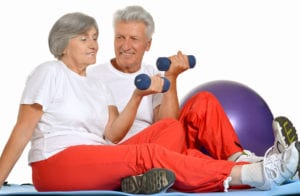Written by Greg Arnold, DC, CSCS. Non-smoking males, aged 50 – 69 years, who took 225 IU of Vitamin E daily for 5-8 years and exercised leisurely, decreased their community-acquired pneumonia risk by 72% compared to those non-smoking males who did not exercise .
 Two significant health concerns in the elderly are pneumonia and the flu. They are the two most common causes of infection-related death in the elderly, accounting for 4.2 million doctor’s visits in 2006 and 52,700 deaths among elderly patients in 2007 1. Estimates for the cost of community acquired pneumonia in the United States among the elderly is more than $17 billion 2.
Two significant health concerns in the elderly are pneumonia and the flu. They are the two most common causes of infection-related death in the elderly, accounting for 4.2 million doctor’s visits in 2006 and 52,700 deaths among elderly patients in 2007 1. Estimates for the cost of community acquired pneumonia in the United States among the elderly is more than $17 billion 2.
As a result, finding ways to maintain lung health in the elderly is extremely important. In a 2016 study 3, researchers followed 7,469 male smokers aged 50 to 69 who were participating in the Alpha-Tocopherol, Beta-Carotene Cancer Prevention study in Finland conducted between 1985 and 1993 4. They were given 225 IU per day of vitamin E for between 5 and 8 years. The subjects provided information on their exercise habits and were followed up to determine the incidence of hospital-treated, community-acquired pneumonia.
The researchers defined leisure exercise as either light (reading, watching TV, listening to the radio, or going to movies), moderate (walking, fishing, hunting, or gardening quite regularly), or heavy (actual physical exercise, such as jogging, skiing, swimming, gymnastics, and court and field sports quite regularly).
The researchers noted a significant benefit of vitamin E supplementation to lung health in males who smoked moderately, specifically less than 2 packs per day (less than 19 cigarettes). Specifically, vitamin E administration, along with leisure exercise, prevented pneumonia in 13% of the participants by the age of 74 years (p < 0.05).
When the analysis was restricted to the age range above 70 years, vitamin E prevented pneumonia in 8% of participants by the age of 74 years (p < 0.05) but did not benefit participants smoking at least 2 packs per day (20 or more cigarettes per day) (p > 0.05). The researchers did not look further into whether any type of exercise (light, medium, or heavy) was superior to another type of exercise.
The researchers then looked at an age-matched set of 2,551 non-smoking males who either exercised leisurely and took vitamin E (807 men), did not exercise and took vitamin E (479 men), exercised leisurely and did not take vitamin E (830 men) or did not exercise and did not take vitamin E (435 men). They found that vitamin E in non-smoking men who exercise leisurely decreased their risk of community-acquired pneumonia by 72% (p = 0.006) but was not significant in those who did not exercise (p = 0.3).
For the researchers, the results of this study, especially the 72% decreased risk of pneumonia in non-smoking men who exercised leisurely, “encourages further research on vitamin E and pneumonia in elderly people.”
Source: Hemila H. Vitamin E administration may decrease the incidence of pneumonia in elderly males. Clin Interv Aging 2016 Oct 3;11:1379-1385. eCollection 2016.
© 2016 Hemilä. This work is published and licensed by Dove Medical Press Limited
Posted November 28, 2016.
Greg Arnold is a Chiropractic Physician practicing in Hauppauge, NY. You can contact Dr. Arnold directly by emailing him at PitchingDoc@msn.com or visiting his web site at www.PitchingDoc.com.
References:
- Prevention CfDCa. Fast Stats: Deaths and Mortality. https://www.cdc.gov/nchs/fastats/deaths.htm.
- File TM, Jr., Marrie TJ. Burden of community-acquired pneumonia in North American adults. Postgrad Med. 2010;122(2):130-141.
- Hemila H. Vitamin E administration may decrease the incidence of pneumonia in elderly males. Clin Interv Aging. 2016;11:1379-1385.
- Alpha-Tocopherol Beta Carotene Cancer Prevention Study Group. “The effect of vitamin E and beta carotene on the incidence of lung cancer and other cancers in male smokers.” New England Journal of Medicine 330, no. 15 (1994): 1029-1035
